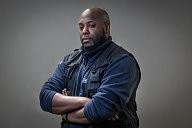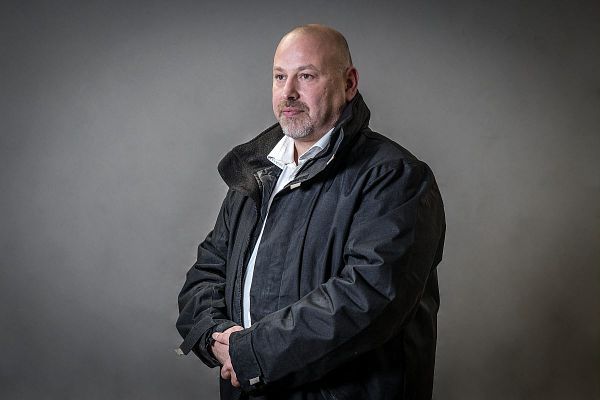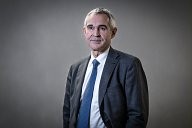Refine search
No keyword found to refine search
keywords EN
Places
Names
4 documents found
| 1 |
Documents per page :

Funeral workers on the front lines of the November 13, 2015 attacks
Olivier Donnars / Le Pictorium
LePictorium_0252167.jpg
November 7, 2016: Stephane Lami, a convoy technician at the Paris City Funeral Service for only a few months during the attacks. Paris (75), France.
"When I arrived at the scene to lift the bodies, it was a surreal scene. There everything was frozen in death, frozen in time. I was impressed by the number of shells that had fallen to the ground and that were not to be stepped on.
And all those bodies... I kept this striking memory of a person asking me if I had seen any of his friends.
I didn't know how to answer him that I had just lifted their bodies. Even though we were prepared and used to it, we were all shocked. We're not supermen."
"When I arrived at the scene to lift the bodies, it was a surreal scene. There everything was frozen in death, frozen in time. I was impressed by the number of shells that had fallen to the ground and that were not to be stepped on.
And all those bodies... I kept this striking memory of a person asking me if I had seen any of his friends.
I didn't know how to answer him that I had just lifted their bodies. Even though we were prepared and used to it, we were all shocked. We're not supermen."

Funeral workers on the front lines of the November 13, 2015 attacks
Olivier Donnars / Le Pictorium
LePictorium_0252168.jpg
November 7, 2016: Jérémy Souffron has been working for 8 years at the Funeral Service of the City of Paris. Convoy technician for 2 years and now is a referent of recession. Paris (75), France.
"When I received the alert from a colleague, I turned on my TV and told myself that in about ten minutes, I would be
on this war scene. But no one can imagine what we saw. Fortunately, we are all united as colleagues.
colleagues, it allows us to evacuate. Now, we have taken a step back. And in spite of everything that could have happened and the fact that we were also marked,
we have to keep on coping. We do a job that is not easy and that few people know about. We work in the shadows. But we must not
But we mustn't forget that with the fire department, the police, the emergency room, we are also part of the chain in case of a crisis."
"When I received the alert from a colleague, I turned on my TV and told myself that in about ten minutes, I would be
on this war scene. But no one can imagine what we saw. Fortunately, we are all united as colleagues.
colleagues, it allows us to evacuate. Now, we have taken a step back. And in spite of everything that could have happened and the fact that we were also marked,
we have to keep on coping. We do a job that is not easy and that few people know about. We work in the shadows. But we must not
But we mustn't forget that with the fire department, the police, the emergency room, we are also part of the chain in case of a crisis."

Funeral workers on the front lines of the November 13, 2015 attacks
Olivier Donnars / Le Pictorium
LePictorium_0252169.jpg
November 7, 2016: Philippe Passeto, a planning officer, has worked for 15 years at the Funeral Service of the City of Paris. Paris (75), France.
"I've always been used to picking up the body of someone who died a violent death or at home. I have always done it without taking into account the environment in order to do my job as well as possible. I thought I would do the same when I thought I would do the same when I arrived at the Bataclan, but in fact I couldn't ignore all the details of the massacre. Phones ringing in a chilling silence, survivors hiding. And it's when you get into the details that the emotional charge
comes to you. It had a profound effect on me."
"I've always been used to picking up the body of someone who died a violent death or at home. I have always done it without taking into account the environment in order to do my job as well as possible. I thought I would do the same when I thought I would do the same when I arrived at the Bataclan, but in fact I couldn't ignore all the details of the massacre. Phones ringing in a chilling silence, survivors hiding. And it's when you get into the details that the emotional charge
comes to you. It had a profound effect on me."

Funeral workers on the front lines of the November 13, 2015 attacks
Olivier Donnars / Le Pictorium
LePictorium_0252170.jpg
November 7, 2016: François Michaud-Nérard, former director general of the Funeral Services of the City of Paris. Paris (75), France.
"In 20 years, I have lived through several crisis situations. But during attacks, it is an accumulation of unjust deaths, especially
young people who could have been my children. In these circumstances, I also wanted to be on the ground on the evening of November 13 and I myself lifted the bodies of about 20 dead people. Every time I go back to the scene, I see the places, the courtyards of buildings where we found the bodies and organized the disposal sites.
A year later, I still think about it, but it's not overwhelming either."
"In 20 years, I have lived through several crisis situations. But during attacks, it is an accumulation of unjust deaths, especially
young people who could have been my children. In these circumstances, I also wanted to be on the ground on the evening of November 13 and I myself lifted the bodies of about 20 dead people. Every time I go back to the scene, I see the places, the courtyards of buildings where we found the bodies and organized the disposal sites.
A year later, I still think about it, but it's not overwhelming either."

 Funeral workers on the front lines of the November 13, 2015 attacks
Funeral workers on the front lines of the November 13, 2015 attacks